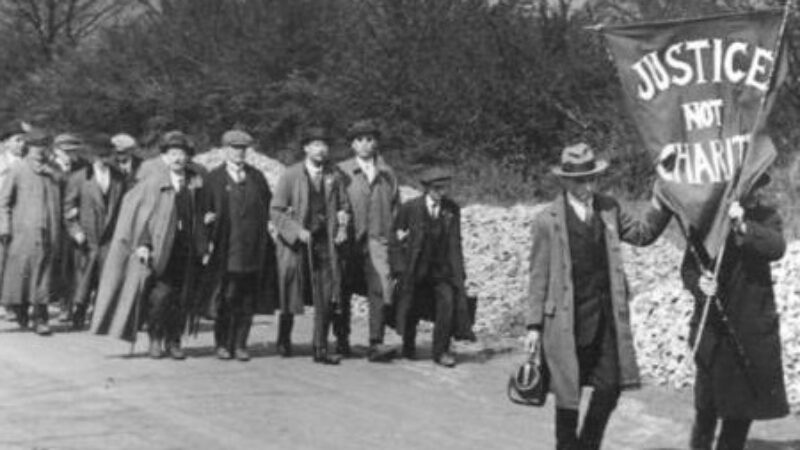
This weekend marks the centenary of a march by blind trade unionists from across the country. Their cause is just as relevant today with only 53.3% of disabled people compared to 81.8% of non-disabled people in work. In 2019 the TUC estimated a 15.5% disability pay gap.
On April 25th, 1920, 171 blind trade unionists reached London to hold a rally with their banners calling for ‘Justice Not Charity’. Organised by the National League of the Blind, the 20-day march involved 74 blind workers from Scotland and the North East marching from Leeds, 60 from Ireland and the North West marching from Manchester and 37 from the South West marching from Newport.
The blind trade unionists took the novel approach of a march from different locations to converge on London for a mass demonstration in Trafalgar Square. There had been many protest marches before, but none had choreographed different contingents to raise awareness with rallies in towns along their route. The Jarrow March in 1936 later was based on their experience.
Blind people had been considered incapable, but with the opening of special schools and sheltered workshop expectations began to change. The Royal Commission on the Blind in 1889 established compulsory education that would lead to trades such as basket-weaving and rug-making. The schools and workshops were segregated facilities.
Pay was on piece rate because it was believed that blind workers could not compete with the output of sighted people. Wages were not enough to meet living costs, and the blind factory workers contrasted their treatment with the affluence of charity administrators who they considered corrupt. Like other workers of the time, they recognised that the way forward lay in uniting to take collective action.
Prior to the march Ben Tillett, Labour MP for Salford North, introduced a bill in support of blind workers’ demands, but it was blocked by the government. The pressure arising from the march and subsequent talks with Lloyd George led to the Blind Persons Act 1920. It was less prescriptive than the league had wanted. Consequently, they continued to lobby against a postcode lottery in local authority pay and provision.
In October 1936 the league held another march. As before, it was supported by trade unions. But the public mood was less supportive, and the blind workers were marginalised by the more prominent national unemployed hunger marches. However, some concessions were secured from the government with a second Blind Persons Act in 1938.
Provision of welfare services and access standards were improved by the Chronically Sick and Disabled Persons Act 1970, introduced by Alf Morris, Labour MP for Manchester Wythenshawe, who went on to be the first Minister for Disabled People in 1974.
The league merged with the union Community in 2000. Ways of working and new technology have changed production lines and offices over the last century. The range of occupations undertaken by blind and other disabled people have widened. Yet high rates of unemployment and low pay continue to hold us back. For those out of work, the situation has been exacerbated by Tory austerity, which has cut public services and brought in the pernicious Universal Credit system.
The legislative framework has strengthened over the last 25 years on disability discrimination and wider equality, but disabled people remain left behind economically and excluded from much of society. The impact of Covid-19 is likely to disproportionately adversely impact on the lives of disabled people. On the other hand, post-lockdown affords an opportunity to do things differently, for example by investing in public services and establishing a National Independent Living Service.
As our movement remembers the 1920 blind workers marching for ‘Justice Not Charity’, disabled people today demand fairness not inequality. That’s why the Labour and trade union movements needs to empower and be more representatives of disabled people. Moreover, a future Keir Starmer Labour government should enshrine the UN Convention on the Rights of Disabled Persons into domestic law.


More from LabourList
Haigh: We won’t shut ticket offices or cut jobs – or nationalise water
Lou Haigh to reveal ‘roadmap’ for public ownership of railways within first term
Rochdale Labour says brick thrown at candidate’s home with ‘f*** Labour’ note